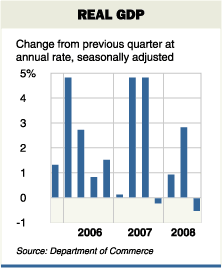This is an official announcement of what most people have already believed about the downturn of the
"A recession is a significant decline in economic activity spread across the economy, lasting more than a few months, normally visible in production, employment, real income and other indicators," according to the NBER's statement. It typically takes a long time after the start of a recession to declare its start because of the need to look at final readings of various economic measures.
The committee does not judge a recession as two consecutive quarterly declines in gross domestic product as many people believe. That has yet to take place during this recession.
Instead, the NBER follows five key indicators to define a recession, of which the two most important are GDP and employment.
The NBER said that the deterioration in the labor market throughout 2008 was one key reason why it decided to state that the recession began last year.The economy shrank in the final quarter of 2007 at a 0.2 percent annual rate before barely edging up at the start of this year. The
Chart: Courtesy of the Wall Street Journal
The broader economic malaise was triggered by the housing downturn, which started in 2006. The fall of housing prices from peak levels reached earlier this decade cut deeply into home building and home purchases. This also caused a sharp rise in mortgage foreclosures, which in turn resulted in losses of hundreds of billions of dollars among the nation's leading banks and a tightening of credit.
The last two recessions (1990-1991 and 2001) lasted eight months each, and only two of the 10 previous post-Depression downturns lasted as long as a full year, according to the NBER.Click the image to see larger view



No comments:
Post a Comment